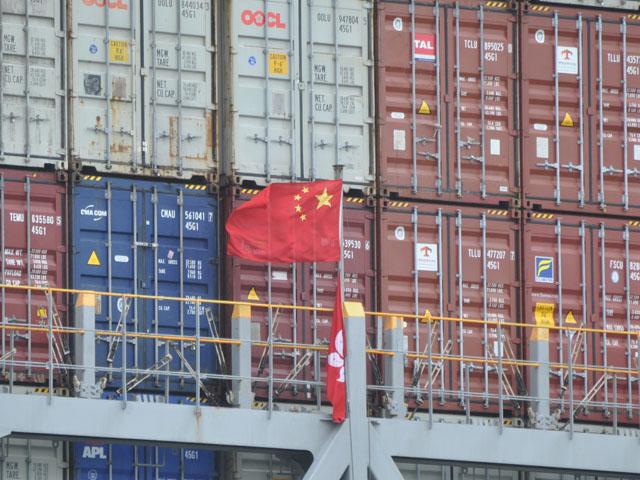Dealing With Supply Chain Challenges
Congress Sends Ocean Shipping Reform Act to President Biden
OMAHA (DTN) -- Agricultural groups and other business organizations are applauding after Congress took final action Monday night to pass the Ocean Shipping Reform Act following two years of supply chain crisis that left billions of dollars of goods at docks while foreign-owned shippers made billions in record profits.
President Joe Biden wants to sign the bill immediately and pressed last week for final passage. He spoke last Friday at ports in California, noting the shipping companies last year raked in $150 billion in profits at the expense of export businesses and consumers. Biden also and met online with Zippy Duvall, president of the American Farm Bureau Federation, and other small business leaders in a final push for the bill. The president said one of the reasons for inflation is shipping rates have skyrocketed in the past two years.
"This bill will make progress reducing costs for families and ensuring fair treatment for American businesses -- including farmers and ranchers," Biden said after the House vote. "I look forward to signing it into law."
The House voted 369-42 on Monday evening to approve the Senate version of the bill, which gives the Federal Maritime Commission (FMC) more teeth to oversee ocean shipping companies. The Senate bill was led by Sens. Amy Klobuchar, D-Minn., and John Thune, R-S.D. The Senate version was considered more watered down than the House version, but lawmakers and the Biden administration concluded it was easier for the House to simply take up the Senate bill rather than go to conference negotiations over the differences in the two bills.
MAJOR OVERHAUL OF REGULATIONS
The bill, the first major overhaul of federal ocean shipping regulations since 1998, gives the FMC more authority to investigate delays and fees charged by ocean carriers. The bill shifts the burden of proof when it comes to excessive "detention and demurrage" fees from exporters to ocean carriers when products are delayed at docks for long stretches because carriers refuse to load them. It also prohibits shippers from refusing cargo space or discriminating against exporters of goods such as agricultural products. Rep. Dusty Johnson, R-S.D., pointed out in debate the House version gave the FMC more tools to address problems such as penalties for false or inaccurate fees, but he still called on colleagues to pass the final bill.
"I see no value in us having the perfect be the enemy of the good," Johnson said. "This does move us in the right direction." He added, "A yes vote is a vote to put U.S. shippers, farmers, manufacturers, truckers, retailers and consumers first."
P[L1] D[0x0] M[300x250] OOP[F] ADUNIT[] T[]
Rep. John Garamendi, D-Calif., who worked with Johnson on the bill, noted the House has passed some version of the act four times. Garamendi said the bill would prohibit unfair practices by foreign-flagged ocean carriers.
"This bill attacks inflation and it will reduce consumers costs. It's not going to solve every problem in the supply chain or every problem for U.S. exporters, but it will make a real difference for American businesses."
Agricultural shippers for nearly two years have complained about ocean carriers refusing to accept their goods in cargo containers at port and instead taking empty containers back to China because they could more quickly load Chinese goods and return those products back to the U.S.
The inability to get goods loaded onto outbound ships has cost U.S. agricultural exporters billions of dollars in lost sales, as well as costs waiting at port. USDA and the Department of Transportation have been working at ports such as Oakland, California, on strategies to get more agricultural products on outbound ships.
SUPPORT FOR BILL
Duvall and Farm Bureau applauded final passage of the bill, citing that record high shipping costs and delays getting access to containers have made it harder for farmers and agricultural exporters to meet growing global demand.
"Some estimates suggest we've lost out on more than $25 billion in agricultural exports over the past six months because of ocean shipping constraints. That's unacceptable," Duvall said. "Limited trade has also made it more difficult to import supplies like fertilizer, which increases costs to farmers and ultimately hurts all families through higher grocery bills."
Duvall added, "I was pleased to team up with President Biden to urge passage and look forward to him quickly signing the Ocean Shipping Reform Act into law so farmers and ranchers can continue to meet the needs of families in America and overseas."
The International Fresh Produce Association also cited that the bill was critical for an industry that relies on timely delivery of perishable goods. The group noted that hundreds of members of the association had lobbied Capitol Hill last month calling on Congress for final passage of the bill.
Dan Halstrom, president and CEO of the U.S. Meat Export Federation, was among those who said the group looks forward to the president signing the bill.
"In these times of rising input costs, it has never been more important to maximize the value of our agricultural products, and the best way to do that is to ensure access to the international marketplace. This legislation takes important steps forward in improving the shipping services available to U.S. exporters," Halstrom said.
Chris Spear, president of the American Trucking Association also said passage of the bill "has been a long time coming," citing the fees that shipping companies collected from truckers contributed to record profits for the carriers.
"Those fees hurt American motor carriers and consumers -- helping to drive record inflation," Spear said.
Chris Clayton can be reached at Chris.Clayton@dtn.com
Follow him on Twitter @ChrisClaytonDTN
(c) Copyright 2022 DTN, LLC. All rights reserved.




